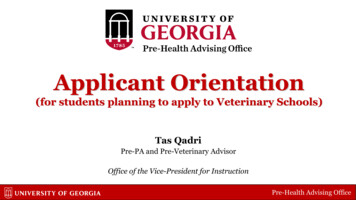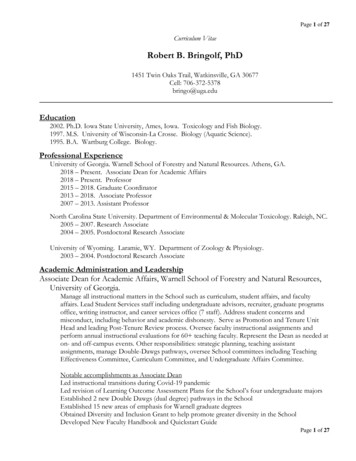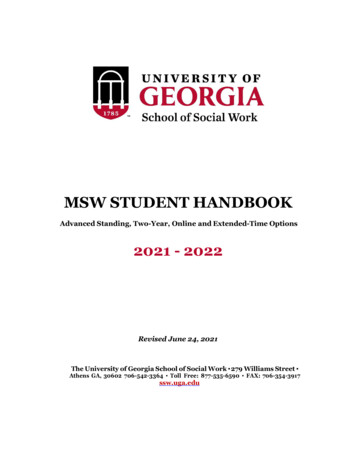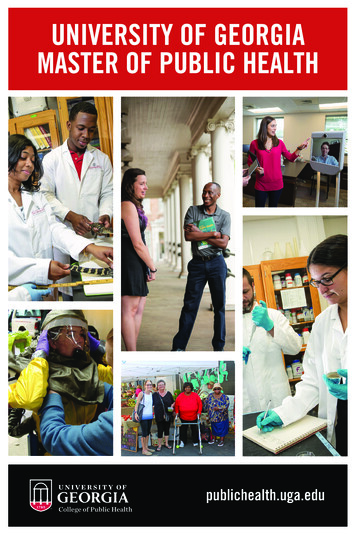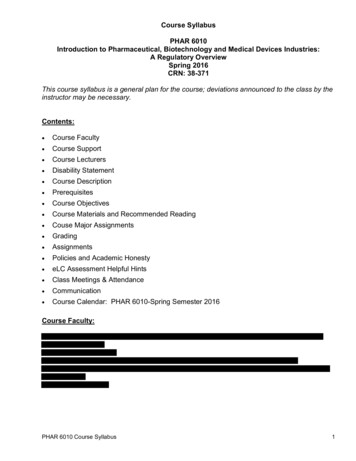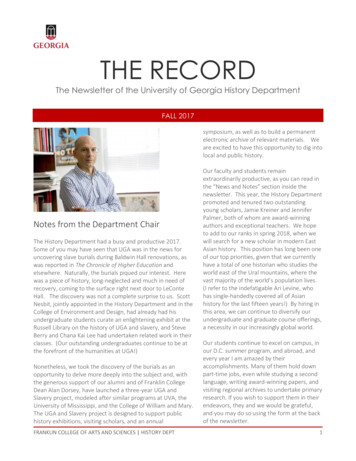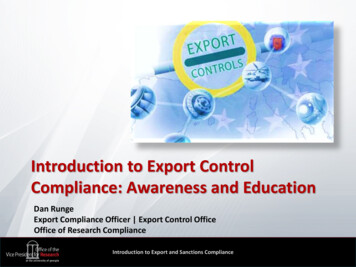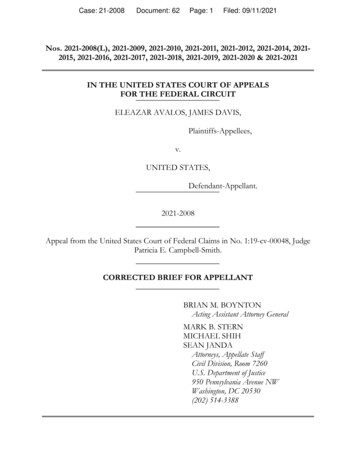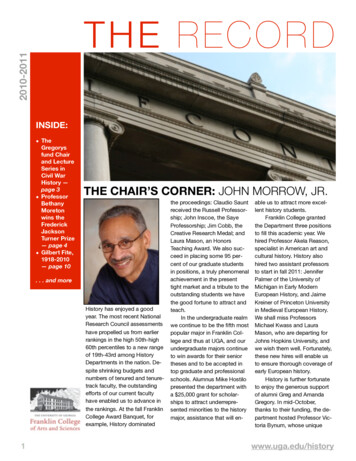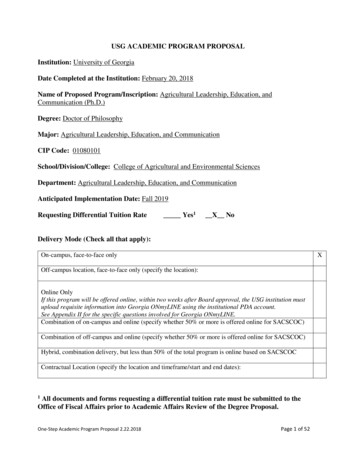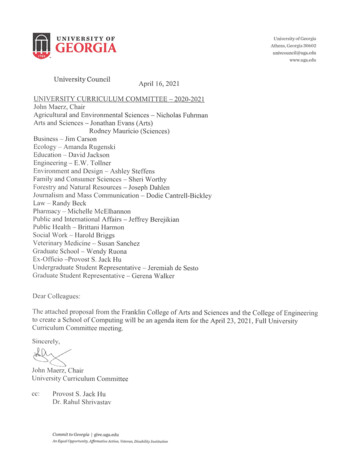
Transcription
April 2, 2021University Curriculum CommitteeUniversity of GeorgiaRE: Proposal to create a School of Computing jointly administered by the Franklin College ofArts and Sciences and the College of EngineeringDear Curriculum Committee Members:We are writing to express our strong support for the proposed framework of a School ofComputing jointly administered by the Franklin College of Arts and Sciences and the College ofEngineering. The disciplines of engineering and computer science are becoming highlyintegrated due to advances in cyber-physical systems, computational sciences, informationsciences, data analytics, and similar fields.The proposed framework includes important details on governance, promotion and tenure, andadministrative structure of the School of Computing. We are pleased to report that the faculty ofthe Department of Computer Science, the Franklin Senate, and the faculty of College ofEngineering have all approved the proposal under consideration. We respectfully seek approvalfrom the University Curriculum Committee so that the initiative may move to theimplementation and planning phase.Sincerely,Alan DorseyDeanFranklin College of Arts and SciencesDonald LeoDeanCollege of Engineering
PROPOSAL TO ESTABLISH THE SCHOOL OF COMPUTING AT THE UNIVERSITY OF ionale for Creating a School of ComputingIII.Organization and AdministrationIV.Faculty AffairsV.Academic ProgramsVI.Computer Science Trends and tionAppendicesA.Computer Science FacultyB.List of Undergraduate and Graduate Computer Science CoursesC.Examples of Schools or Colleges of ComputingD.Facilities and Equipment1
AbstractThis proposal seeks to elevate the Department of Computer Science, which is housed in theFranklin College of Arts and Sciences, to a School of Computing that would reside jointly underthe Franklin College of Arts and Sciences and the College of Engineering. The new Schoolwould become the fourth school in the College of Engineering and the third school in theFranklin College of Arts and Sciences. The establishment of a School of Computing (SoC)would create new opportunities that benefit students and enhance research activity at theUniversity of Georgia.I. BackgroundDepartment of Computer ScienceThe Department of Computer Science at UGA was established in 1984, initially with just eightfaculty and a single undergraduate degree program. Prof. Robert W. Robinson served as the firstDepartment Head. Shortly thereafter, the Master of Applied Mathematical Sciences (MAMS)degree was added (jointly with Mathematics and Statistics). The Master of Science in ComputerScience degree program was created and approved in 1987, and the department grew to 11faculty. The number of graduate students has been increasing steadily. The Ph.D. program inComputer Science was approved in 1993 and began admitting students in 1995. The number offaculty grew to 14. In 1999, the State of Georgia launched a focused expansion of computing andengineering fields with the Yamacraw Initiative, a state program designed to increase research ofbroadband technologies, attract broadband companies to Georgia, and foster start-ups. ComputerScience at UGA participated in the program, which resulted in a significant growth of the facultyranks and the funding of research in key areas of computing.The Department of Computer Science currently has 23 full-time, tenure-track faculty, 8 nontenure track faculty, and more than 1,300 students—1,134 undergraduates and 190 graduatestudents (see Appendix A for list of all faculty). It offers several degree and certificate programs,including B.S., M.S., and Ph.D. degrees in Computer Science. An M.S. degree program inCybersecurity and Privacy enrolled its first students in Fall 2020.In addition, the Department of Computer Science and Department of Statistics jointly haveoffered a B.S. degree in Data Science since Fall 2019. The Department of Computer Scienceoffers a Master of Applied Mathematical Sciences (MAMS) degree in conjunction with theDepartment of Mathematics, and a joint Computer Science/Statistics M.S. degree in DataScience is currently under consideration via faculty governance. Computer Science also offers anUndergraduate Certificate in Applied Data Science, Certificate in Computing, as well as aGraduate Certificate in Cybersecurity (see Appendix B for list of courses).College of EngineeringFounded in 2012, the College of Engineering builds upon a long history of Engineeringprograms at UGA, which awarded its first Engineering degrees in 1868 and established theFaculty of Engineering in 2001.The College of Engineering consists of three schools: The School of Electrical and ComputerEngineering; the School of Environmental, Civil, Agricultural, and Mechanical Engineering; and2
the School of Chemical, Materials, and Biomedical Engineering. The College of Engineeringcurrently has 61 full-time tenure-track faculty, 23 non-tenure-track faculty, and nearly 2,500engineering majors—2,309 undergraduate students and 168 graduate students. The Collegeoffers eight undergraduate degree programs, five master’s degree programs, and two doctoralprograms. One of its degree programs—a B.S. in Computer Systems Engineering—already hasstrong ties to the Department of Computer Science in the form of joint classes, and severalfaculty members in both programs have courtesy appointments.II. Rationale for Creating a School of ComputingA joint School of Computing (SoC) between the College of Engineering and the FranklinCollege of Arts and Sciences will create new opportunities in instruction and research whileenhancing the reputation of computer science and engineering programs at the University, aswell as the reputation of the University as a whole.Instructional BenefitsA recent white paper from the Computing Resources Association1 notes that computing and datascience have become relevant to almost every area and domain outside the sciences and alsowithin every domain of engineering. Enrollment in STEM related occupations is projected by theBureau of Labor Statistics to grow 8% through 2029, more than the double the 3.4% growth fornon-STEM occupations.2 Within STEM, both computer science and engineering are among thefields with the highest growth.3In response to trends such as these, enrollment in computer science and engineering programs atUGA has experienced rapid growth in recent years. Fall 2020 enrollment in computer sciencetotaled 1,321 students, 1,146 undergraduates, and 175 graduate students.4 This represents an 49%increase since fall 2015, when total enrollment was 889 students.The growth of the Department of Computer Science has recently been constrained by the highstudent-to-faculty ratio and limited availability of space. Despite recent hiring in the department,the relatively low number of the CS faculty and the high enrollments in computer scienceprograms translate to a very high student-to-faculty ratio (40:1, as of Fall 2020). Student-tofaculty ratios for computer science and engineering programs at UGA’s comparator andaspirational peers that incorporate computer science are significantly lower.5With resources from both the Franklin College and the College of Engineering, strategic hiringof new faculty into the SoC can better support undergraduate and graduate instruction in keyareas of specialization, especially those in high demand among students, as well as strategicresearch du/data/facts/enrlmj/ataglance/5Aspirational: Penn State 14:1, Illinois 24:1, Virginia 27:1 UT Austin 38:1; Comparator: NC State 30:1, MichiganState 36:1, Purdue 36:1, Kentucky 22:1.23
Research SynergiesThe importance of computing and computational systems is especially true in the variousdisciplines of engineering where sensors, machines, and systems are connected via the internetand volumes of data are generated through such connections. Computational systems (machinesand algorithms) make use of such data to infer the state of the systems and support optimaldecision-making. In fact, many engineering systems are considered cyber-physical systemstoday. Computer science and computing are essential to the teaching and research mission of theCollege of Engineering. Robotics and artificial intelligence are emerging areas of teaching andresearch that require close collaboration between the disciplines of computer science andengineering.Moreover, Computer Science plays an increasingly important role in advancing scholarshipacross the Arts and Sciences. The new Data Science program involves a successful collaborationbetween Computer Science and Statistics, while a new emphasis in natural language processinginvolves an important collaboration with Linguistics. Ongoing efforts to advance Bioinformaticsand the Digital Humanities also benefit from their collaboration with Computer Science.Reputational BenefitsThe majority of UGA comparator and aspirational peers administratively connect computerscience and engineering programs. An analysis of several rankings methodologies demonstratesthat the reputations and rankings of colleges of engineering in the U.S. are closely associatedwith the reputations of the computer science and engineering programs. In addition, the majorityof UGA comparator and aspirational peers incorporate computer science within their engineeringcollege.The increased visibility of the SoC would also facilitate the recruitment of distinguished faculty,who further enhance the University’s reputation.III. Organization and AdministrationStructure and LeadershipThe Department of Computer Science will fully transition into the new SoC. The FranklinCollege of Arts and Sciences and the College of Engineering will jointly fund, house, andadminister the new SoC. This transition will retain the current faculty, staff, and the set ofcurrent Department of Computer Science guidelines and bylaws governing faculty and staffreviews, faculty promotion, and standing committees. These will be accepted as the initialfaculty and staff and the initial set of guidelines and bylaws for the SoC and will apply uniformlyto all SoC faculty. The two respective College Deans and a representative of the Provost’s Officewill form a Governing Council for the SoC (the SoC Governing Council). The Provost’srepresentative will ensure the alignment of policy and guidelines between the two Colleges sothat a consistent set of policies and guidelines will apply to the SoC and its faculty.The SoC will be led by a Director (or an equivalent title to be decided later) recommended by avote of the SoC faculty to the two Deans on the SoC Governing Council. The Deans will make ajoint selection of the Director and submit the recommendation to the Provost for approval. TheDirector may appoint one or more Associate Directors (or an equivalent title to be decided later)to support the administration of the SoC. The Director of the SoC will meet with the SoC4
Governing Council periodically to report on the progress toward strategic goals and will providean annual report.The Director will be assisted by an administrative structure extending from the Department ofComputer Science, including an Associate Director, an Executive Committee elected by theeligible SoC faculty, other standing committees, and office staff.Transition PeriodFor day-to-day management of the SoC, a liaison to the SoC Governing Council will serve as asingle point of contact for administrative issues that may not require the direct and immediateinvolvement of a Dean or the SoC Governing Council. During the transition period, the liaisonwill be an Associate Dean of the Franklin College. Until the SoC develops a set of approvedpolicies that will replace the existing College-level policies, and to facilitate a smooth transitionfrom the current status as a Department, the SoC will follow College-level policies andguidelines established by the Franklin College. During this transition period, the SoC willdevelop its own set of policies in place of Franklin College and College of Engineering policies.These policies will be developed by the SoC faculty, with input and approval from the SoCGoverning Council, and consistent with University policies. The SoC Director will have theautonomy to implement the policies of the SoC.The SoC will be reviewed within three years after its formation to identify strengths, weaknesses,and opportunities for improvement. The review will coincide with the end of the transitionperiod. Consistent with other academic units across campus, the SoC will be placed in theregular review cycle within the UGA’s Office of Accreditation and Institutional Effectiveness.Faculty and staff associated with the Department of Computer Science at the time of transitionwill be associated with the SoC. In addition to the continued support from the Franklin Collegeof Arts and Sciences, the SoC also will receive commensurate staff support from the College ofEngineering in matters of budget and finance, human resources, pre-award and post-awards grantmanagement support, and IT support.Advisory BoardThe Department of Computer Science has an existing External Advisory Board that willcontinue. Upon formation of the SoC, the Director, with input from the SoC, will recommendadditional Advisory Board candidates. The final selection of new Advisory Board members willbe done through a majority vote by the SoC faculty.IV. Faculty AffairsAppointment, Promotion, and TenureFaculty in the SoC will be governed by the same set of policies and by-laws, irrespective of theCollege that funded their position. The SoC will function as a Promotion and Tenure Unit (PTU),and the Director will serve as the PTU head. Current faculty in the College of Engineering mayapply to join the faculty of the SoC. Each faculty transitioning to the SoC will require a vote ofthe eligible SoC faculty and approval by the SoC Governing Council, following the SoC andUniversity policies and guidelines for faculty appointment. If a faculty appointment is approved5
by both the SoC faculty and the SoC Governing Council, the SoC will become the faculty’sPTU.The SoC will have a single set of PTU guidelines for appointment, review, and promotion for allof its faculty. There will be no distinction in the policies and guidelines regarding promotion andtenure, or any other faculty affairs, for the new SoC faculty, regardless of which College fundedtheir position. The SoC PTU guidelines will be initially based on the current Computer Scienceguidelines.Promotion and tenure of the faculty would be first considered and voted on by the SoC (as thePTU). The next level of review (College-level review) will consist of a joint committee withthree members of the Franklin College of Arts and Sciences and three members of the College ofEngineering, who are appointed by the respective Deans. Deans of both Colleges will jointlyreview candidates for promotion and tenure before dossiers advance to the University reviewcommittees. Faculty members hired prior to the formation of the SoC will have the option ofgoing through the current promotion and tenure path (to the Franklin College reviewcommittees) or through the new promotion path (to the joint committee of Franklin College andEngineering).Following the School/College review, all promotion cases originating from the SoC will beconsidered and voted on by the appropriate University Review Committee. Although mostfaculty may be reviewed by the Physical Sciences committee, depending on the facultymember’s expertise, another review committee, such as the Professional and Applied Studiescommittee or the Life Sciences committee, may be appropriate. A common set of guidelines willbe applied to all appointments and promotion of lecturers in the SoC.The SoC will provide a unified set of teaching, scholarship, and service expectations and makerecommendations on how these expectations could be aligned in the School. Within the SoC, allfaculty will follow the same set of guidelines and expectations established within the School.These unified expectations will form the basis for annual faculty evaluations and determiningmerit-based pay raises.InstructionTeaching loads in the Department of Computer Science are based on the fact that there are manyfour-credit-hour courses. This Task Force recommends that the SoC adopt the teaching loadcurrently expected in the Department of Computer Science. New faculty hires in the SoC willassume a similar teaching load as existing SoC faculty commensurate with their track (tenuretrack or non-tenure track lecturer) and rank.Faculty GovernanceThe faculty of the SoC will be eligible to participate and contribute to faculty governance in bothColleges, including promotion and tenure decisions, faculty affairs, curricular affairs, and otheracademic functions that require faculty vote.6
V. Academic ProgramsThe SoC will maintain and grow the existing Computer Science-administered undergraduate andgraduate programs. The SoC will administer the B.S., M.S., and Ph.D. in Computer Scienceprograms, and the M.S. program in Cybersecurity and Privacy. During the transition period, theSoC will introduce any necessary changes to the degree programs with respect to college-levelrequirements. Additional programs in emerging areas of computing can also be created by theSoC. New courses and new programs will be approved by the governance structure in both theFranklin College and College of Engineering before moving to University-level review.The SoC will maintain the current structure of student advising in conjunction with studentadvisement in the Franklin College of Arts and Sciences. This Task Force recommends that theFranklin College and the College of Engineering put policies in place to accommodate studentswho wish to transfer between Computer Science and Engineering programs, given that theundergraduate Engineering programs have a secondary admissions process and limits portabilityfor students.The SoC will maintain and strengthen its association with the Institute for Artificial Intelligence,the Institute for Cybersecurity and Privacy, the Georgia Informatics Institutes, and the Center forCyber-Physical Systems. The Institute for Artificial Intelligence will remain in the FranklinCollege. The Institute for Cybersecurity and Privacy (ICSP), which is currently housed in theDepartment of Computer Science, will be housed in the SoC and will retain its current ICSPfaculty and institute-specific bylaws. The SoC will continue participating in the Data Scienceprogram currently administered jointly by Computer Science and Statistics.The SoC also will be involved in providing the necessary courses of general interest toUniversity students. The SoC has the potential to explore the creation of University-wideeducational initiatives in the general areas of Computing and Data Literacy. The EECS 101,“Thriving in a Digital World,” course at the University of Michigan, UGA’s aspirational peerinstitution, is a notable example. This course explores computational technologies and how theyimpact society and our everyday lives.This Task Force envisions opportunities for many innovative collaborative programs between theSoC and other UGA units. The SoC may consider allowing courtesy faculty appointments (ifapproved by the SoC faculty) from those units to fund SoC graduate students and serve as theirmajor advisor. These enhanced collaborations have the potential to become a game-changer forgrowing the graduate programs of Computing at UGA.VI. Computer Science Trends and ComparisonsIn North America, computer science departments have been traditionally housed within a collegeof sciences or engineering. With the rapid advances in computing and storage capacity in the bigdata era, the entire discipline of computer science has grown tremendously, pushing itsboundaries into broader areas, such as artificial intelligence, robotics, human-computerinteraction, machine learning, natural language processing, cognitive psychology, security andprivacy, and data science—all of which fall under the encompassing term “computing.”7
Computing has dramatically increased productivity in business, industry, and management bycreating cyberspace—the ubiquitous collection of networks and computers that function as thenervous system of modern society.Today, computing has become pervasive in nearly every discipline. This has prompted manyuniversities to take an expansive view of computer science and to explore the possibility ofcreating institutional homes for computing by either transforming a computer science departmentinto a school of computing and placing it within an existing college or housing a computerscience department in a standalone college of computing along with other broader areas. Here,the term “college” refers to an academic organization headed by a dean. The 2019 white papertitled “Creating Institutional Homes for Computing: Transforming a Department into a School orCollege” published by the Computing Research Association (CRA) is a comprehensive report onthe growing trend of transforming a department of computer science into a school or housing itwithin a college of computing. The report discusses strategies for such a transformation andprovides a list of 25 current schools or colleges of computing in North America and notes thatmore are likely to be created. In each of these instances, the primary motivation for transforminga computer science department into a school or creating a college of computing is to allow thediscipline to embrace the broader role of being a catalyst for interdisciplinary research andeducation across the university, and thereby efficiently manage these needs throughout thecampus.By April 2019, about 25 computer science departments in North America had either transformedinto a school of computing housed within an existing college of sciences or engineering or werehoused in a standalone college of computing (see Appendix II of the CRA report for a full listingand Appendix C of this proposal for selected examples). More specifically, of the 25 computerscience departments, four (Arizona State University School of Computing Informatics, andDecision Systems Engineering; Clemson School of Computing; Montana State UniversityGianforte School of Computing; and University of Washington Paul G. Allen School ofComputer Science and Engineering) transformed into a school of computing but remained withinthe college of engineering; about 18 computer science departments were housed within astandalone college of computing along with other computing-related areas; and the remainingthree either transformed into a standalone school of computing or elevated their status to a schoolbut remained in the college of sciences. In some of these instances, large donors to theuniversities facilitated the transformation to schools/colleges of computing. There are also threeother universities not mentioned in the CRA report where the department of computer sciencehas been elevated to a school level but housed in either the college of sciences or the college ofengineering along with related disciplines (School of Computer Science at Brandeis University,School of Computer Science and Management at University of Nebraska–Lincoln,School of Electrical Engineering and Computer Science at LSU).The creation of an intercollegiate School of Computing that would be jointly administered byboth the Franklin College of Arts and Sciences and the College of Engineering builds on theUniversity’s history of promoting interdisciplinary programs such as the joint MPA/JD degree,administered by the School of Public and International Affairs and the School of Law6, egree/8
Double Dawgs7 programs, and MBA degrees offered through the Terry College of Business thatare linked with JD, Engineering, MPH, PharmD, and MD degrees8.As mentioned earlier, the Department of Computer Science has already embracedinterdisciplinary research and education across units within Franklin College of Arts andSciences. Given the notion that computing incorporates three main research paradigms—theory,rooted in mathematics; abstraction (modeling), rooted in science; and design, rooted inengineering—it is a natural next step to transform the Department of Computer Science into aSchool of Computing. Forming this new school would not only strengthen existingcollaborations, but also facilitate new formal collaborations with units on campus.VII. FacilitiesRegarding physical location, the majority of the Computer Science space and part of the Collegeof Engineering is currently located in Boyd GSRC (see Appendix D for details on facilities andequipment). It is anticipated that this proximity will facilitate further, more expansivecollaboration between the SoC and the College of Engineering on joint programs and research.As future potential space may be considered for the SoC, consideration should be given to spacethat will bring all SoC faculty offices and lab spaces to physical proximity to foster moreeffective collaboration.VIII. FundingThe SoC will be established with funds available to the existing Department of ComputerScience, as currently placed within the Franklin College of Arts and Sciences. FY22 programfunding, which includes operating funds and supplemental instructional funding, will beprovided by the Franklin College.Graduate teaching assistants are funded centrally in the College of Engineering, but theDepartment of Computer Science currently receives a supplemental instructional budget from theFranklin College to use at the discretion of the Department Head for graduate teaching assistantsand part-time or limited-term faculty. This Task Force recommends that the SoC continue toreceive instructional budget at least at the current level. This Task Force recommends thatinstructional funds for graduate teaching assistants be shared by both colleges proportionally tothe number of faculty funded by each college. These funds will be used at the discretion of theSoC director for graduate teaching assistants and part-time or limited-term faculty.IX. ImplementationAn implementation committee will be established to provide faculty input into theimplementation of the SoC. This committee will have representatives from the current ComputerScience Department, Franklin College, and the College of Engineering. The representatives fromthe current Department of Computer Science will be elected by the faculty of theDepartment. The implementation committee will advise the SoC in formulating a vision and astrategic plan during the transition period, as well as the College-level policies for the SoC. Inaddition, the implementation committee will provide input into resource needs from the twoColleges. An interim director will be appointed through the same process discussed in section x.php9
APPENDICESA. Computer Science FacultyCOMPUTER SCIENCE FULL TIME FACULTYIsmailcem Budak Arpinar, Associate ProfessorBrad Barnes, Senior Lecturer and Undergraduate CoordinatorSuchendra M. Bhandarkar, ProfessorLiming Cai, ProfessorMichael Cotterell, LecturerPrashant Doshi, ProfessorShelby H. Funk, Associate ProfessorLe Guan, Assistant ProfessorBill Hollingsworth, Senior LecturerMaria Hybinette, Associate ProfessorMustakimur R. Khandaker, Assistant ProfessorManijeh Keshtgari, LecturerIn Kee Kim, Assistant ProfessorKrzysztof J. Kochut, Professor and Associate Department HeadSalvatore Lamarca, LecturerJaewoo Lee, Assistant ProfessorKyu Hyung Lee, Assistant ProfessorSheng Li, Assistant ProfessorTianming Liu, Distinguished Research ProfessorSachin Meena, LecturerChenglin Miao, Assistant ProfessorJohn A. Miller, Professor and Graduate CoordinatorRamviyas Nattanmai Parasuraman, Assistant ProfessorHao Peng, LecturerRoberto Perdisci, Patty and D.R. Grimes Distinguished Professor/ Director of the ICSPShannon Quinn, Assistant ProfessorLakshmish Ramaswamy, ProfessorKhaled Rasheed, ProfessorEman Saleh, LecturerThiab Taha, Professor and Department HeadWenwen Wang, Assistant Professor10
COURTESY AND ADJUNCT FACULTYKyle J. Johnsen, Associate Professor of EngineeringJessica Kissinger, Professor of GeneticsChangying Li, Professor of EngineeringKang Li, ProfessorPing Ma, Professor of StatisticsFred Maier, Assistant Research ScientistHanchuan Peng, Associate ProfessorAmit P. Sheth, LexisNexis Professor of Computer Science, University of South CarolinaWenzhan Song, Georgia Power Mickey A. Brown Professor of EngineeringYing Xu, Professor and Eminent Scholar of Biochemistry and Molecular BiologyWilliam York, Associate Professor of Biochemistry and Molecular BiologyEMERITUS FACULTYHamid Arabnia, Professor EmeritusE. Rodney Canfield, Professor EmeritusWalter Potter, Professor EmeritusRobert W. Robinson, Professor EmeritusJeffrey W. Smith, Associate Professor Emeritus11
B. List of Undergraduate and Graduate Computer Science CoursesComputer Science Courses (125)CSCI 1100 / LCSCI 1210CSCI 1300CSCI 1301 / LCSCI 1302CSCI 1360CSCI 1730CSCI 1900CSCI 2150 / LCSCI 2610CSCI 2611CSCI 2670CSCI 2720CSCI 2725CSCI 3030CSCI 3030HCSCI 3360CSCI 4050/6050CSCI 4060/6060CSCI 4070/6070CSCI 4080/6080CSCI 4130/6130CSCI 4140/6140CSCI 4150/6150CSCI 4170/6170CSCI 4210/4210CSCI 4250/6250CSCI 4260/6260CSCI 4270/6270CSCI 4300CSCI 4330/6330CSCI 4350/6350CSCI 4360/6360CSCI 4370/6370CSCI 4380/6380CSCI 4470/6470CSCI 4490/6490CSCI 4500/6500CSCI 4520/6520CSCI 4530/6530CSCI(ARTI) 4540/6540CSCI(ARTI) 4550/6550CSCI 4560/6560CSCI 4570/6570Topics in ComputingComputer Modeling and ScienceIntroduction to Programming with PythonIntroduction to Computin
3 the School of Chemical, Materials, and Biomedical Engineering. The College of Engineering currently has 61 full-time tenure-track faculty, 23 non-tenure-track faculty, and nearly 2,500
